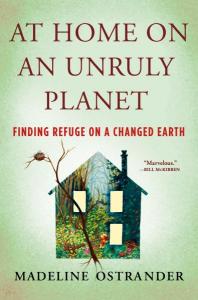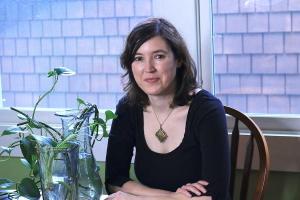
Madeline Ostrander—At Home on an Unruly Planet: Finding Refuge on a Changed Earth
FINDING REFUGE ON A CHANGED EARTH
Madeline Ostrander
Henry Holt and Co., August 2, 2022, $28.99
ISBN-10: 1250620511, ISBN-13: 978-1250620514
Macmillan Audio (read by Ostrander) ISBN: 9781250856128
Ostrander reports:
My book began more than 10 years ago in a garden full of kale and strawberries along a former railroad, threaded between a school and ramshackle warehouses.
At the time, I was both editing and reporting for YES! Magazine. A group of urban farmers drove me around Richmond, California, and told me about their dreams for this often-neglected industrial city built around a century-old oil refinery. They spoke about the climate crisis in a way that I’d rarely heard before, with tangible, local ideas about how to transform their hometown into a place of gardens and organic food.
This reporting transformed how I thought about climate solutions. We speak often about the climate crisis either at a vast scale—global data, national and international policies—or at the micro-scale of our personal carbon footprints. But what does it mean in our communities, in the places that we live in and identify with? What does it mean at home?For a while, the publishing industry was hesitant to take on new climate books. I offered an unusual approach: the book would be both narrative and “big think.” It would include evocative stories paired with philosophical ideas from writers such as Wendell Berry and bell hooks.
In 2018, I signed with literary agents Laura Usselman and Stuart Krichevsky, who asked me to rethink the book’s structure, diving deeper into characters and places. I have interwoven four stories of crises (in part one of the book) and solutions (in part two). These include Okanogan County, Washington, a region that has journeyed through wildfire and recovery; Newtok, an Alaska Native community relocating because of severe erosion; the urban farmers in Richmond, California, who are reinventing their refinery town; and preservationists seeking to protect St. Augustine, Florida, one of the most historic communities in North America, from floods.
The book meditates on emotions and what it means to have a home in a time of instability: An excerpt appeared in The Atlantic. I hope readers encounter in these stories a visceral and hopeful way of thinking about how the climate crisis affects each of us at home, and how to take action.
Contact info:
- Madeline Ostrander, https://madelineostrander.com/, Twitter: @madelinevo, Instagram: @madelinevo
- Book: https://us.macmillan.com/books/9781250620514/athomeonanunrulyplanet
- Audiobook: https://read.macmillan.com/lp/at-home-on-an-unruly-planet-audiobook/
- Agent: Laura Usselman, lu@skagency.com
NASW members: will your book be published soon? Promote it by submitting your report for Advance Copy.
Tell your fellow NASW members how you came up with the idea for your book, developed a proposal, found an agent and publisher, funded and conducted research, and put the book together. Include what you wish you had known before you began working on your book, or had done differently.
See https://www.nasw.org/advance-copy-submission-guidelines.
View Advance Copy archives at https://www.nasw.org/member-article/advance-copy.
Thinking of writing a book? If you are a NASW member, you may access a list of more than 200 books and online resources to help you craft your book proposal, find an agent and funding sources, negotiate your contract, learn about self-publishing, publicize and market your book, and more at https://www.nasw.org/article/write-book.
Send book info and questions about book publishing to Lynne Lamberg, NASW book editor, llamberg@nasw.org.
Follow @LynneLamberg on Twitter for news about science/medical books, writing, and NASW authors.
Banner image adapted from original photo by Madeline Ostrander. NASW members: Share photos of your office bookshelves for use on our website. Upload photos to bit.ly/naswpicsubmit.
Advance Copy
The path from idea to book may take myriad routes. The Advance Copy column, started in 2000 by NASW volunteer book editor Lynne Lamberg, features NASW authors telling the stories behind their books. Authors are asked to report how they got their idea, honed it into a proposal, found an agent and a publisher, funded and conducted their research, and organized their writing process. They also are asked to share what they wish they’d known when they started or would do differently next time, and what advice they can offer aspiring authors. Lamberg edits the authors’ answers to produce the Advance Copy reports.
NASW members: Will your book be published soon? Visit www.nasw.org/advance-copy-submission-guidelines for information on submitting your report.
Publication of NASW author reports in Advance Copy does not constitute NASW's endorsement of any publication or the ideas, values, or material contained within or espoused by authors or their books. We hope this column stimulates productive discussions on important topics now and in the future as both science and societies progress. We welcome your discussion in the comments section below.





